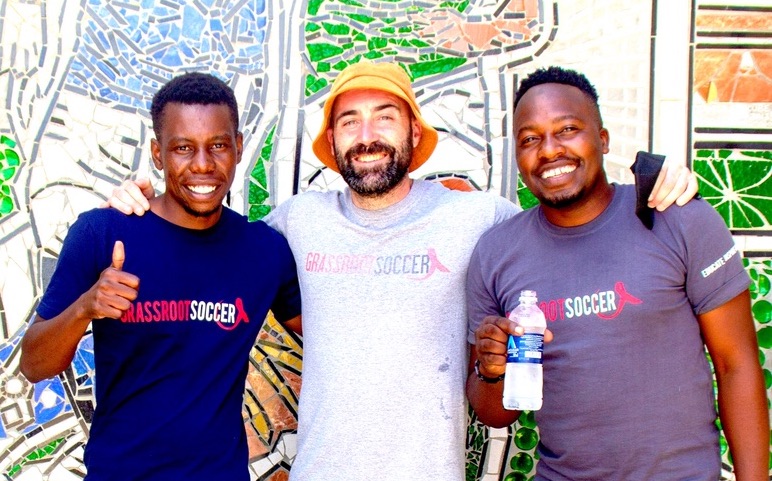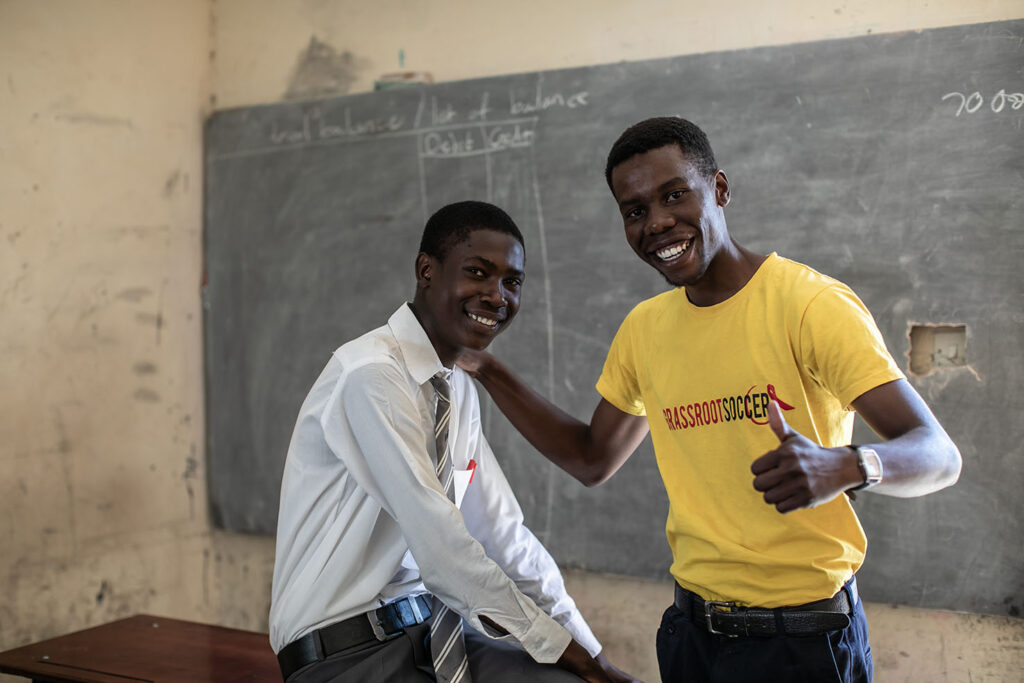
Back in 2016, Grassroot Soccer (GRS) trained more than 100 young people to become SKILLZ Coaches at the Bulawayo Bowling Club in Bulawayo, Zimbabwe. One of those Coaches was me.
SKILLZ Coaches are community-based youth mentors who are trained to deliver GRS’s signature SKILLZ curricula to young people in fun and interactive sessions, which is a key component of the organization’s 3 C’s approach (Curriculum, Coaches, Culture). Coaches also conduct home visits for participants and meet with their parents and guardians to foster meaningful parent-to-child communication.
Becoming a SKILLZ Coach was an experience that I had been eagerly awaiting. I had applied to join the organization because of my interests in sports, especially football, and the opportunity to become a mentor for young people in my community. After the training, I realized that I had gained much more than what I had expected — and it changed my life completely.
I had grown up in a very strict and religious family where issues to do with sex were never discussed. It was considered vile to talk about sex, and the consequences of doing so were dire. My father would reprimand us without even trying to understand why we wanted to discuss the subject as young people.
The knowledge and information on sexual and reproductive health (SRH) and the facilitation skills I received during my training to be a Coach gave me the confidence to freely and assertively talk about sex. I became a changemaker, first in my family and then in my community.
At home, I was happy to see my dad learning something new from me, and I encouraged my younger brother and sisters to go for HIV testing and counselling. I myself had never accessed the HIV testing and counseling (HTC) service until I had the opportunity to do so during one of GRS’s testing events, shortly after the training. From then on, it also become part of my lifestyle to go for HTC services two to three times a year.
The training also equipped me with important life skills. The topic of resilience — bouncing back from challenges — became my personal daily mantra. I realized that suffering a setback does not make you a failure. Getting back up, keeping on working hard, and pushing further and further will eventually help you to achieve your goals in life.
This was key for me and my fellow SKILLZ Coaches because we encouraged and supported one another as we became a team during the training. We bonded and discovered our strengths and weaknesses, and at the end of it all we helped each other even outside of the SKILLZ programs.
I had participated in guidance and counselling sessions during my high school, but the SKILLZ programs were quite different. Topics on how to achieve goals in life, avoiding peer pressure through the “Say No” skills, how to avoid risks, and having a strong support system were a real eye opener for me, and I still use them up to this day.
My favorite activity from the training was “Juggling My Life.” This activity highlighted the consequences of sex, like unwanted pregnancies and sexually transmitted infections (STIs) including HIV, with the key lesson that sex is a big choice. The knowledge from this training was my opening cue when I wanted to start an open discussion about SRH with my family and friends, and I could notice the difference I was making. I had become a role model within a short period of time.
Throughout all the training activities, the one aspect that made everything stick for me and my fellow SKILLZ Coaches was the GRS culture. The soccer-based activities and metaphors, the energizers, the snaps, the kilos — it was all fun. GRS made the training and joining the SKILLZ team something memorable, something savory.

Most of the young people in my community face the challenge of peer pressure, which leads to unprotected sex and drug and substance abuse without thinking of the adverse consequences. When I finished the SKILLZ Coach training, I was prepared to make a change in my community; I was ready to make my move and become a role model and an SRH champion, providing adolescent boys and young men with critical SRH information to help them resist peer pressure and make good decisions for their health and future.
As I started working with young people in my community, I knew my role as a SKILLZ Coach and how I fit into GRS’s 3 A’s impact model: building adolescents’ Assets (health knowledge and the confidence to use it), improving their Access to high-quality health services, and increasing their Adherence to crucial treatments and healthy behaviors.
I shared accurate information with adolescents to dispel myths and misconceptions around HIV and AIDS. I created safe spaces for them to be open about the health challenges that they were facing. And I helped them to overcome those challenges, linking many to youth-friendly SRH services so that they could safely and confidently access the services they needed without the fear of being judged.
Praise Dumi Dlakama is a former SKILLZ Coach who joined Grassroot Soccer in 2016, working in Bulawayo, Zimbabwe. Since becoming a Coach, he has gone on to work as a GRS research assistant, communications intern and assistant, and now serves as a consultant for GRS’s Global Communications team.